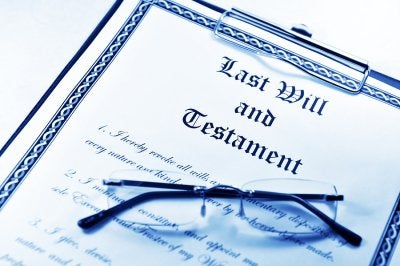-
The Probate Process at a Glance

A probate court in the Woodlands handles the legal process that occurs once someone dies, including appraising the deceased person’s property and distributing property according to the will. Probate usually involves court appearances by a probate lawyer, who receives compensation from estate property. The process begins when the person named as executor to the will, or a person appointed by a judge, files paperwork with the local probate court.
During this time, the executor to the will must find, secure, and manage assets throughout the probate process, which can take several months to a year. Depending on the amount of the deceased’s debts, the executor may talk to a probate attorney about selling the real estate, securities, or property. In most states, family members can ask the court to release short-term funds during the proceedings to pay for necessary expenses. The court can then grant the executor permission to pay the debts and taxes before dividing the remainder according to the will. The last step of the probate process is transferring the property ownership to the new property owners.
-
The Importance of Preparing Your Will [INFOGRAPHIC]
Did you know that at least half of Americans with children do not have a will? While thinking about passing away can be difficult, it’s important to take steps to make sure your family and loved ones are taken care of once you are gone. That’s why working with an experienced lawyer in estate planning in The Woodlands is so important. When a person dies testate, this means that he or she has a valid will. If a person dies intestate, there is no valid will, so property and assets are divided up according to state guidelines. Without a valid last will and testament, your property could end up being divided contrary to your wishes. Take a look at this infographic to understand the differences between being testate and intestate. Please share with your friends and family.

-
The Basics of Writing a Will
According to an AARP survey , two out of every five Americans over the age of 45 haven’t written a will. While many Americans may avoid this process because it entails actively planning for their demise, creating a will is one of the most important ways to plan for loved ones. Working with a probate and will attorney in the Woodlands allows someone to put his or her wishes on paper and help his or her heirs avoid unnecessary legal hassles.

What is a will?
A will is a legal document in which someone declares how and who will manage his or her estate after death. This estate can consist of big, expensive items like a vacation home as well as smaller items that hold sentimental value, like family photos. The person appointed to manage the estate is called the executor, as he or she is tasked with executing the testator’s wishes. However, there are certain types of property, like retirement accounts, that aren’t covered by wills. In such cases, the testator should discuss how to transfer ownership in this property with a will attorney. Creating a will also overlaps with other family law areas, as the testator can declare who will become guardian to his or her dependents in the will.Is an attorney necessary?
Contacting a law firm is not required to create a will. However, an experienced will lawyer provides useful advice on estate-planning strategies, such as how to create a living trust within a will. Whether someone decides to create his or her own will, or seeks the advice of a lawyer, he or she needs to consider all essential estate-planning documents. Indeed, this is a great time to research financial and health care powers of attorney.Should you create a joint will?
Will lawyers and estate planners tend to advise against joint wills. In fact, some states don’t even recognize them as legally valid. The problem in joint wills is that it is rare for both spouses to die at the same time. Additionally, many couples have property that is not jointly owned. Even though a couple’s separate wills may look similar, it’s recommended to just create separate legal documents. -
Grounds for Divorce
A number of states provide for fault-based divorce grounds. This means that a spouse and his or her divorce lawyer in The Woodlands can claim the other spouse was at fault for the end of the marriage. Common grounds for fault divorce claims include adultery, cruelty, and abandonment.
In this video, a family law attorney explains the difference between filing a fault and no fault divorce petition. As he explains, someone only needs to allege the irretrievable breakdown of marriage or irreconcilable differences in a no-fault divorce claim. No-fault divorce empowers a couple to end their marriage if they desire without citing a legal reason. No-fault divorce represents a modern trend in family law. Even if the petitioned spouse doesn’t wish to divorce, he or she cannot object to the divorce proceedings. In traditional fault divorce cases, the petitioned spouse could object to the grounds for divorce.
-
Why You Should Have a Will
There is a common misconception that if you die without a will, your personal belongings will pass to your next of kin automatically. In reality, with or without a will, the probate courts will determine how to distribute your assets, which may or may not be consistent with your true wishes. Avoiding probate in The Woodlands requires you to meet with a will attorney and specify how your possessions should be divided.
Ensure belongings go to beneficiaries
Wills ensure that certain belongings go to desired beneficiaries. Every probate court will review the will for validity and actually having a will, rather than an intestate estate, will speed up the probate process. In meeting with a will attorney, you can also outline how you would like certain assets to be used following your death. For example, you can bequeath a car to a family member and express your wishes that he sell it to support his education. Even though this stipulation isn’t binding, the will allows you to convey your final wishes in giving assets to your beneficiaries.
Limit family disputes
Courts only allow contesting a will in very limited circumstances. Usually, this occurs when there is evidence the will is not legitimate because the person making the will was not of sound mind. By drafting a will, you can help ease tension among family members in dividing your assets. Your will attorney can help you use specific language to ensure there is no doubt or confusion as to how you would like your assets divided following death.Quantify your assets
If you haven’t drafted a will, a probate attorney may send inquiries to local banks and financial institutions to assess your financial situation. Your family members may also have to produce financial paperwork, including brokerage statements, government bonds and stock certificates. The purpose of this requirement is to ensure all of your assets exist and can be divided equitably. Creating a will helps avoid this step because you have formally outlined your assets and provided details of their value. You can also include a contingency clause assigning a beneficiary to any assets that you don’t specifically include in your will. -
Meet Andrew J. Bolton, Esq.
 The Law Office of Andrew J. Bolton, Esq. is a law firm near The Woodlands with additional offices in Huntsville and Sugar Land Texas. Our firm focuses on the specific needs of each of our clients, whether they are dealing with divorce, child custody or drafting wills. Even though our family law attorneys are compassionate during client consultations, we provide aggressive representation in the courtroom.
The Law Office of Andrew J. Bolton, Esq. is a law firm near The Woodlands with additional offices in Huntsville and Sugar Land Texas. Our firm focuses on the specific needs of each of our clients, whether they are dealing with divorce, child custody or drafting wills. Even though our family law attorneys are compassionate during client consultations, we provide aggressive representation in the courtroom. Andrew J. Bolton is a family lawyer and was a longtime resident of Cypress, Texas and is a current resident of New Waverly, TX. Mr. Bolton graduated from Cypress Creek High School in 1981. Following graduation, Mr. Bolton went on to earn his Bachelor’s Degree in Spanish Language at Brigham Young University in Utah. He then earned his Doctorate of Jurisprudence at the J. Reuben Clark School Of Law. During law school, he was also editor of the BYU Journal of Law and Education. Following law school, Mr. Bolton returned home to Texas and began practicing family law. He was partner in the law firm of Bolton & Bolton, PC in Tomball, Texas and then served as City Attorney for the City of Magnolia, Texas. As a lawyer, Mr. Bolton’s goal is to provide the best quality legal representation by developing long-term relationships with clients.
-
What to Know About Divorce in Texas
In Texas, you can file for divorce on either fault or no-fault grounds, so it’s important to work with a divorce lawyer in The Woodlands who understands both processes. Filing for divorce based on fault grounds may be advantageous when it comes to dividing marital property or assigning alimony. However, filing for no-fault divorce allows you to negotiate the end of your marriage without assigning blame or fault.

Property division
Before meeting with a lawyer about your divorce claim, you need to ensure you meet the Texas residency requirement for divorce. This means that either you or your spouse must be Texas resident for at least six months prior to filing for divorce. Texas is a community property state, meaning that all income and property acquired during your marriage is considered marital property. At divorce, you and your spouse equally own the property, so division among you and your spouse is equal.Child custody
In every state, the court presumes that frequent and continuing contact with each parent following divorce is in the child’s best interests. As a result, judges support joint custody agreements whenever possible. However, depending on the circumstances of your case, a judge may allocate custody differently. If you are considering asking for primary custody, you should discuss your options with a family lawyer.Child support
Following divorce, both you and your spouse are required to financially support your child. However, the exact amount of child support depends on each of your incomes, financial resources, and time spent with the child. Sometimes, a court will assign a higher income requirement if one parent has the capacity to earn more than he or she is currently earning. A child support attorney can help you calculate your potential child support obligations following divorce.Spousal maintenance
In Texas, a court may award spousal support if you are unable to earn enough income to provide for basic needs, you were married more than 10 years or you have custody of a child who requires special care. However, you need to provide evidence that you made a good faith effort to earn an income. -
Fill in the blank Wills
Can I use a will from on-line or an office supply store? I never hear this question in my office. If my clients didn’t think a professional was necessary, they wouldn’t have scheduled an appointment to see me. However, this is the question I am most often asked outside my office, wherever people discover that I write wills. While almost everyone knows they should have a will, most people don’t. A form or store-bought will does seem like a cheap and easy alternative to an expensive lawyer. Nevertheless, my objection to such wills may be summed up in the words of a Taylor Swift song: “You don’t know what you don’t know.”
So, the quick answer to this question is that wills that promise they are “valid in all fifty states”, usually do, in fact, produce a will, which is valid in Texas. However, you may be letting your heirs in for a lot of heart ache if you actually use one.
There are five major reasons not to use prepackaged or fill-in-the-blank wills.
- It may easily end up costing more in the long run. Form wills often cost more to probate, and often take more of your (and your probate attorney’s) time. Texas has an unusual but effective probate process. A properly written Texas will is both quick and relatively inexpensive to probate. Those one-size-fits-all wills are often not written to take advantage of our Texas laws. Over the years, we have seen form wills from 11 different companies, including some of the most heavily advertised companies, and have yet to see a will which is written to take full advantage of Texas’s stream-lined probate system. In sum, having a valid will is not enough; it must also be the best will for probate proceedings in Texas.
- Your will may not say what you think it says. I have seen this in my practice when box wills are brought into me for revision. Do you know what “representation per stripes” means? If not, the extra money spent on a lawyer just make make a difference. A good example is a man with two children and three grandchildren. When interviewed, he wanted to split his property evenly between his two children. In the event one of his children died before him, he wanted the children of his dead child to inherit their parent’s share. He was unaware that, under the computer generated form he had had in place for the last several years, if one of his two sons died before him, the surviving child would inherit everything. Of course, with respect to the form wills that I have been asked to probate, I cannot tell my client whether or not the testator intended to disinherit his grandchildren, I can only tell them that he did.
- You probably have not thought of everything which should be addressed in your will, and most forms will not make the suggestions to you. The most common element left out of form wills is what should happen if a minor ends up inheriting property. Almost every will has at least some possibility that this will occur. Even if your children are grown, most people want their grandchildren to inherit if a child predeceases them. In that case, who will manage the money? Should it be the grandchild’s surviving parent? What if the surviving parent divorced your child, or if they were never married. Maybe you just don’t trust the other parent. At what age should the children/grandchildren come into their inheritance? What restrictions should be placed on the money? It is a rare eighteen year old capable of being responsible for more than one month’s living expenses. Any competent attorney will walk you through these questions and suggest solutions. Most form wills will not.
- When you see an attorney for a will, you usually get a lot more. By this, I mean a lot more documents. A power of attorney in particular is frequently needed in addition to any will, and, if you do not have one in place, it can cost your family thousands of dollars in fees and expenses for a guardianship proceeding.
- If you use an attorney, you have greater confidence that your will has been properly executed. This may seem like a very simple thing, but it ends up being a problem a lot more often than you would think. Not only must the witnesses be present when the will is signed, but the testator needs to be present when the witnesses sign. Also, people who inherit, cannot act as witnesses. The testator must state to the witnesses that he is signing a will. These issues and other have been used to hold an otherwise legal will, invalid. This is why most attorneys have wills signed in their offices, rather than sending a client home with an unsigned document.
As an aside, courts have also determine some fill-in-the-blank wills to be invalid holographic wills (wills written in the handwriting of the testator) and thus not subject to probate. If you have a fill-in-the-blank will for probate, we strongly urge you to have the assistance of counsel prior to attempting any probate.
Here is a good example of why you might want an attorney to assist you in drafting a will. Often, I have a client come in who owns a “special car,” and the client desires that a particular child inherit that special automobile. Drafted by himself, the will might plainly state: “To my son, John, I give my 1969 Corvette.” Well, the right 1969 big block Corvette can go for over $100K in the right market, so to compensate the client’s other kids for not getting the Corvette, the client then reduces the amount of other estate items that he gives John. Ten years down the road, however, the client makes a wonderful trade of that 1969 Corvette and gets a 1962 Ferrari in the deal. Now, he’s made a wonderful trade and John will be even happier, right? Wrong. Because the will mentioned a “Corvette” and not a “Ferrari,” John not only misses out on the Ferrari, but remember, the client reduced his share of the estate due to fantastic gift that he’s not going to be awarded. John gets less , not more. A properly drafted will might say: “I give to John most most valuable automobile at the time of my death.” Or perhaps, “I give to John my Corvette or any accession resulting from the disposal of that automobile.” Get a lawyer!
Oral Wills
In many states, a person can make an oral or “nuncupative” will under the proper circumstances. However, I will not delve deeply into that arena since Texas has outlawed oral wills since 2007. In sum, do not delay drafting a proper Texas will because gifts made orally will no longer be recognized in a Texas probate court. In such circumstances, you will have to settle for an family settlement agreement, if possible, or perhaps a proceeding to determine heirship.
In sum, if you are contemplating a probate of a fill-in-the-blank will, and you are concerned, there may be options or alternatives available. As noted, a Family Settlement Agreement (or FSA) might be appropriate, or, if the will is declared invalid, then a proceeding to determine heirship may be needed. At any rate, we stand ready to assist in all these areas.
-
“And to my worthless son the only thing I leave is . .
my Bible in the hope that he will one day actually open it.” Such wording is an example of what we call a nominal gift. And they are more common than you might think. Gifts are not usually a Bible; I more often see gifts of $1, or perhaps $100. Such provisions often appear for two reasons: The first is a desire on the part of the person making the will to get one last dig in at someone they dislike. More frequently, however, the reason is that the testator is following an attorney’s advice. In such cases, the concern is that if you make no mention of one of your children (known in probate lingo as the “objects of your affection”), then it could be argued that you accidently forgot them. This, in turn, would open up an avenue for a will contest. As noted, part of the legal requirements for being sufficiently competent to make a will include knowing “the natural objects of your affection.”
So if you are not competent enough to know who your children or spouse is, then you are likely not competent enough to make out a will. And if you have four children, and divide all your property among three of them, maybe you weren’t all that competent to begin with. So there are attorneys out there who, over the centuries, have advised their clients “Don’t completely disinherit a child, leave them something. How about $1?” In one stroke, you have thus proven that you know they exist, and it was not senility or error that caused them not to inherit. Personally, I am cocerned with nominal gifts, although I have written them when a client requested. I think nominal gifts put the executor in a difficult emotional situation, and obviously increases the possibility of a will contest. Lets look at three scenarios where the nominal gift causes problems.
In the first case, dad was furious with Leo and instructed his executor to give Leo one handful of dirt from the family homestead. The executor, Leo’s sister was actually on pretty good terms with Leo. Does she now have to actually give him a handful of dirt? Well, yes. She took an oath to the Court to uphold the will. So now she has to choose between hurting her brother’s feelings or dishonoring the will, the Probate Court, and her own oath. Oftentimes, in such cases, the heirs will enter into a family settlement agreement and override dad’s wishes anyways.
But more commonly, the executor does not want to give the nominal gift, because they do not want to cause potential problems. Bart has not kept in contact with his mother at all. In fact, if had not been for the nominal gift that suddenly arrived, he would never have known his mother died. But now he does know. And he knows there is a will submitted to the Court, which means an inventory is on file, and Bart is curious, so he gets a copy from the Court and wow! Bart had no idea mom was worth that much. If his mother had given him half, instead of leaving everything to his rotten sister, Lisa he would have gotten . . . enough to see an attorney over, anyway. And since Mom lived with Lisa the last 5 years of her life, he is going to argue the Lisa exercised undue influence over Mom. And suddenly Lisa is facing a will contest, all because she sent a nominal gift. But mom doesn’t want Bart to get half. Just be aware that nominal gifts invariably cause hard feelings and much litigation.
In a third scenario, Uncle Jesse tried to write his own will, and he left his daughter, Daisy $1. Not being a lawyer, Uncle Jesse he didn’t do a very good job of the will. He didn’t provide for an independent administration, which means the Court has to oversee everything. The executor, Luke, will now need a performance bond, and the probate will also cost much more. (There is a way around even this, if you can get the agreement of all the beneficiaries) But wait! Daisy was left $1. That makes her a beneficiary. And why should she agree to an independent administration? She’s going to want something to be agreeable. Uncle Jesse’s $1 gift just cost his heirs many thousands of dollars.
The argument against a nominal gift is even stronger now. On September 1, 2007, the Texas legislature passed Texas Probate Code 128A, which requires that the executor send a copy of the will to every beneficiary of the will within 60 days of the will being admitted to probate. Then the executor has to file an affidavit with the court listing the beneficiaries and the addresses, and swearing that the notices have all been sent. Even if a disinherited child is aware of their parent’s death, there is something about holding a copy of the actual will in your hands that makes you think of contesting it. After all, you already have it, you may as well take it to a lawyer and just see what they think.
I never advise in favor of a nominal gift. Not only are there the three arguments listed above against it, but there really is no reason for it. The legal concerns that cause some attorneys to advise client to leave their child $1, can be addressed in other ways. For example, you can put in a paragraph that says essentially. “I have deliberately made no provision for my son, Zorro. I have a good reason for this decision, and he is familiar with it.”
If you have questions regarding this, or another matter, please contact my office at 936-435-1908 or 281-723-2791 to schedule an appointment with an attorney.
Visiting this blog does not create an attorney-client relationship. Information should not be considered legal advice.
-
Destroy your old will
Many attorney-drafted wills state that all previous wills are revoked. Nevertheless, I advise my clients to physically destroy their old wills. It doesn’t really matter how you do it. You can tear it up, burn it, shred it, or even write “I revoke this will” on each page and sign it. The point is that you do some “physical act” to indicate that you have revoked your old will. You do not need to wait until your new will is drafted. If you would prefer Texas intestacy over the terms of your old will, destroy the old will immediately (please be sure that you understand Texas intestacy laws first). Texas is replete with cases where a will is accepted despite convincing testimony that the testator was in the process of replacing it.
The purpose of destroying an old will is to prevent someone else from attempting to probate that will in Court. You would be amazed to know how often old wills are submitted for probate. You should avoid giving out or making copies of your will. This is because if an original will cannot be located, a copy can be probated, along with testimony of what happened to the original, and a statement that the will was not, to the applicant’s knowledge, revoked. But once a copy of your will leaves your possession, then you can never again be sure that all the copies have been destroyed. Even if you ask your disinherited child for the copy of your old will back, and he gives it to you, he may have made additional copies in the meanwhile. There is no way to tell. The result? A potentially expensive fight in probate court.
In addition to destroying copies which you may have of an old will, you should advise the attorney who drafted that old will that you have made a new one (thus allowing them to destroy, or otherwise annotate the old will with an eye towards preventing an unnecessary will contest).
Similarly, you should avoid signing multiple original wills. If a will cannot be located, the presumption is that the testator destroyed the will, intending to revoke it, which can make the will which is located susceptible to challenge.
Just as a missing original will raises the presumption that it was destroyed by the testator, an undestroyed original will, raises the obvious presumption that it was not revoked. If you have more than one undestroyed will, you run the risk not only that someone will deliberately probate a will which you have revoked, but the risk that they will do so accidentally, or even be forced into probating it. It is especially important to destroy your old will where you have made dramatic changes to who inherits, or where you would prefer Texas intestacy to operate over the terms of your prior will. This is because a person who finds a will of a deceased person has an obligation to submit it to the Court, and if they do not do so, they can be called into Court to show why the will has not been submitted, and then can be ordered jailed until the will is submitted.
There have been multiple cases where someone told us that they had found an old will, but knew a more recent will had been written, but had been unable to find it. If an undestroyed, original will is in existence, it is difficult to persuade the Court that it was revoked.
If you would like to speak to an attorney about challenging a probated will, or replacing an existing will, please contact my office at 936-435-1908 for an appointment in Conroe, Huntsville or The Woodlands. Sugar Land or Stafford residents may call 281-723-2791.
When you write a new will, it is important to make sure that you destroy your old one!
RECENT POSTS
categories
- Uncategorized
- Estate Planning
- Probate
- Family Law
- Drafting a Will
- Divorce Lawyer
- Texas Family Law
- Divorce
- Real Estate
- Probate Court
- Child Custody
- Andrew J. Bolton
- Esq.
- Adoption
- Law Office of Andrew J. Bolton
- Wills
- Executor
- Infographic
- Guardianship
- Trusts
- Contested Divorce
- Child Support
- Attorney
- Living Wills
- Contested Will
- Prenuptial
- Probate Bond
- Heir Apparent
- Legacy Contact
- Living Trusts
- legal guardian
- Legal Disputes
- property rules
- Common Law
- Stocks
- Estate Tax
